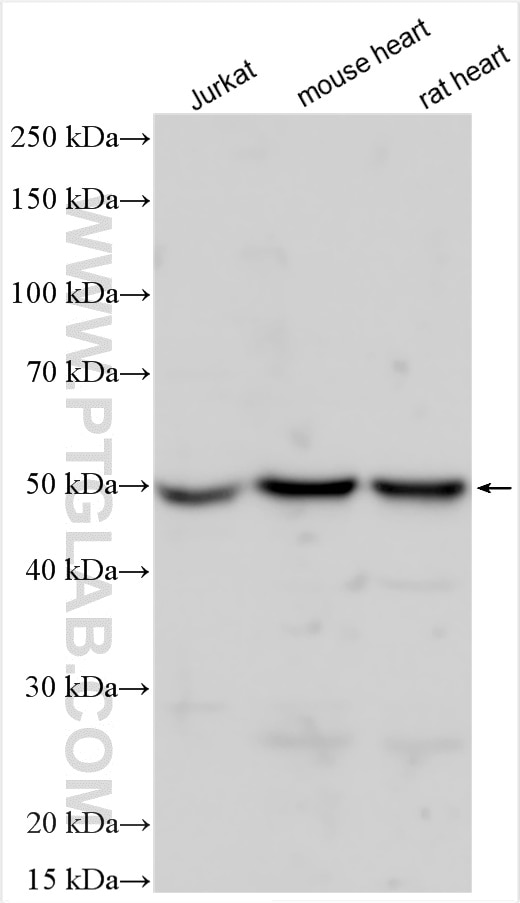PPP2R5A Polyclonal antibody
PPP2R5A Polyclonal Antibody for WB, ELISA
Host / Isotype
Rabbit / IgG
Reactivity
Human, Mouse, Rat
Applications
WB, ELISA
Conjugate
Unconjugated
Cat no : 29365-1-AP
Synonyms
Validation Data Gallery
Tested Applications
| Positive WB detected in | Jurkat cells, mouse heart tissue, rat heart tissue |
Recommended dilution
| Application | Dilution |
|---|---|
| Western Blot (WB) | WB : 1:2000-1:10000 |
| Sample-dependent, check data in validation data gallery | |
Product Information
29365-1-AP targets PPP2R5A in WB, ELISA applications and shows reactivity with Human, Mouse, Rat samples.
| Tested Reactivity | Human, Mouse, Rat |
| Host / Isotype | Rabbit / IgG |
| Class | Polyclonal |
| Type | Antibody |
| Immunogen | PPP2R5A fusion protein Ag31072 相同性解析による交差性が予測される生物種 |
| Full Name | protein phosphatase 2, regulatory subunit B', alpha isoform |
| Calculated molecular weight | 486 aa, 56 kDa |
| Observed molecular weight | 50-56 kDa |
| GenBank accession number | BC022474 |
| Gene symbol | PPP2R5A |
| Gene ID (NCBI) | 5525 |
| Conjugate | Unconjugated |
| Form | Liquid |
| Purification Method | Antigen affinity purification |
| Storage Buffer | PBS with 0.02% sodium azide and 50% glycerol pH 7.3. |
| Storage Conditions | Store at -20°C. Stable for one year after shipment. Aliquoting is unnecessary for -20oC storage. |
Background Information
Protein phosphatase 2, regulatory subunit B (B56), alpha isoform (PPP2R5A) is one of the regulatory subunits of the protein phosphatase 2A (PP2A), which is a major member of protein serine/threonine phosphatases in cells. PPP2R5A can regulate the cellular location, substrate specification and protein phosphatase function of PP2A, through which PPP2R5A plays an important role in many cellular activities. It has been reported that PPP2R5A relates with many diseases including cancers by regulating many crucial signaling pathways involved in P53, Bcl-2, CDK, MAPK, JAK/STAT, c-Myc and β-Catenin.
Protocols
| Product Specific Protocols | |
|---|---|
| WB protocol for PPP2R5A antibody 29365-1-AP | Download protocol |
| Standard Protocols | |
|---|---|
| Click here to view our Standard Protocols |


